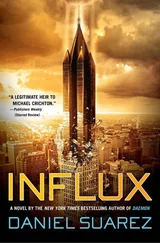Shen was nodding as he said it. “The camera’s position is probably already known, but it could also be derived from a geometric analysis of surrounding landmarks. Software, General. It could all be done with software.”
Haverford was still shaking his head. “But that would . . . it’s just not possible.”
“Why not, Mr. Haverford? Do you think Americans are the only ones who can think ‘outside the box’?”
Zhang was unreadable. “How do we fix it?”
“The first rule of computer security, General, is don’t leave your equipment where people can mess with it.” He gestured to the screen. “What do we have here? Two million cameras sitting around in public? How many fiber-optic lines connecting them to publicly reachable network cables? Literally anyone anywhere in that complex chain could have done this.”
“Then we need to have the cameras fixed. Replaced.”
“And how do you know that you can trust the people who do the replacing?” Shen stood up and turned to the general. “I hope I have not spoken out of turn, sir.”
General Zhang stared with great intensity at the image of Ross still on the screen. “You are dismissed, Captain Shen. I will be in touch with you soon.”
Shen saluted grandly once more, casting Haverford a slight grin. Shen moved to depart.
“Oh, and Captain.”
Shen turned.
“Excellent work.”
He replied in Mandarin. “It was my pleasure, General.”
Shen continued toward the buttonless elevator, and all he could think of was the great game that was now under way out there in the world. A game an old friend told him about. One that he had just now resolved to join.
Chapter 17: // Immortality
Darknet Top-rated Posts +392,783↑
The Burning Man Project has finished prototyping a fully functional Roy Merritt avatar linked to darknet and public Internet news feeds. Presidio and Enoble_6 have begun development of a “just-in-time” hero module. Individuals wishing to donate levels, credits, or powers to the avatar can contact any Order of Merritt signatory.
Quillor*****/ 3,147 21st-level Programmer
Loki’s traveling rig was a tribute to American automotive excess. He drove a customized Ford F-650 4x4 with a Caterpillar diesel engine. It had nine hundred foot-pounds of torque and could pull twenty-six thousand pounds up an unpaved 7 percent grade. With a series of three chromed fuel tanks tucked beneath each running board, that incline didn’t need to be anywhere near a gas station either. Composite-laminate windows and ceramic composite plating meant the driver and three passengers could recline in comfort while enduring a barrage of small arms fire. It was, in short, the ultimate vehicle for commuting through the Apocalypse.
It could have accommodated five passengers if Loki hadn’t extended the storage area to provide room for various pieces of high-tech wireless communications equipment and supplies. This was, after all, his mobile base of operations for running the one-man Stormbringer faction.
Toward that end, Loki towed an enclosed forty-four-foot Gooseneck racing trailer, whose exterior surface was emblazoned with the image of a black-helmeted motorcycle racer viewed from the shoulders up and done in the style of a Japanese anime character. The entire branding effort was completed with the logo for Stormbringer Motorcycle Racing, jagged with lightning bolts.
To all outward appearances, Loki was a professional motorcycle racer following his circuit through the Midwest. The fact that his real business was hunting down and destroying at any cost a shadowy mercenary army hired to kill Daemon operatives was well concealed behind the patina of professional racing. With his big corporate sponsors (unwilling though they might be) listed on the trailer’s wall, he looked more than legit. He looked downright establishment.
However, in this fight, as in all things, Loki remained a loner. He had no crew of mechanics. He preferred instead to communicate his needs through the darknet—pressing into service local maintenance factions to repair his fleet of razorbacks and microjets. That was, after all, what the trailer was for—a storage facility for a score of Type 2-E razorback interceptors and half a dozen microjet aircraft—as well as his personal black Ducati S-version Streetfighter motorcycle, which he rode into battle against The Major’s people. So far he’d slain or captured at least a hundred of the bastards, and he was on his way to tracking down more—dragging them screaming from their motel rooms or safe houses like pigs to slaughter. Their blind trust in the anonymity of their communications would be their undoing.
But each battle brought damage, and for this Loki had to seek out darknet communities where he could get replacement bikes and turn in his damaged units. This had brought him here to Garnia, Missouri—a small, economically depressed town out in the plains that was transforming itself into a bustling new darknet community. Founded by a logistics faction—an Order of Merritt signatory, no less—they’d be able to service his razorbacks, provide fuel cell batteries, replace wireless receivers, and so on. Loki would also be secure in the knowledge that he wouldn’t be hassled by the police—because, as in all darknet communities, the police here would be fellow darknet members.
Regardless of Loki’s half-star reputation score, he knew that no one would question him. He was the leader of an infrastructure defense faction—an unpleasant job that frequently caused him to commandeer local darknet resources in defense of the network as a whole. Everyone knew he had to pass frequent fMRI scans to prove to the Daemon his actions were legitimate—aimed at defense of the Daemon’s constituent parts. So the opinions of fellow darknet operatives mattered little to Loki. The Daemon was all that mattered.
Another fact that swayed other operatives to comply was the network level shown on his call-out. Loki was a fifty-sixth-level Sorcerer, and the most powerful operative in North America—possibly the world. It was hard to know, really, since operatives above fiftieth level could employ power masking. But Loki wanted everyone to see his power.
As Loki brought his huge pickup and trailer rig through the sleepy town’s main street—if such a loose collection of a dozen houses could be called a town—he marveled at what some people accepted as living. The downtown consisted of a single convenience store, a weather-beaten gas station, and a down-in-the-mouth auto-parts store. Loki knew the big-box stores thirty miles off near the interstate had killed most of the local businesses. He imagined the auto-parts store survived primarily because you couldn’t get to the big-box stores if your car was broken down. With gas rising past six dollars a gallon, that dynamic would likely change soon—as would the shipment of cheap, plentiful parts from China.
Beyond the old commercial center of Garnia, there were new businesses sprouting, and ironically much of that life seemed to be sprouting out of the same shipping containers that had helped to destroy the local economy in the first place. The multicolored corrugated-metal boxes littered the landscape, and as Loki drove through the edge of town, he could see darknet operatives pulling lumber, aluminum beams, and construction equipment from them. He also saw the flash of welding coming from within several—mobile fabrication workshops. Loki had seen it before. Local faction leadership had no doubt pooled their resources to call down a construction kit from the network. They’d have to return it to the network pool when they were done, but there were a hundred operatives out there in the fields building homes, businesses, and setting up farms to serve as the center of a new holon. Trying to recolonize America with something that didn’t have a 30 percent interest rate and a forty-five-minute commute attached to it.
Читать дальше












